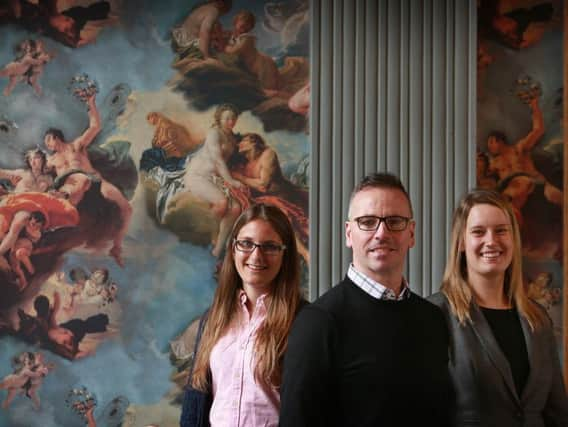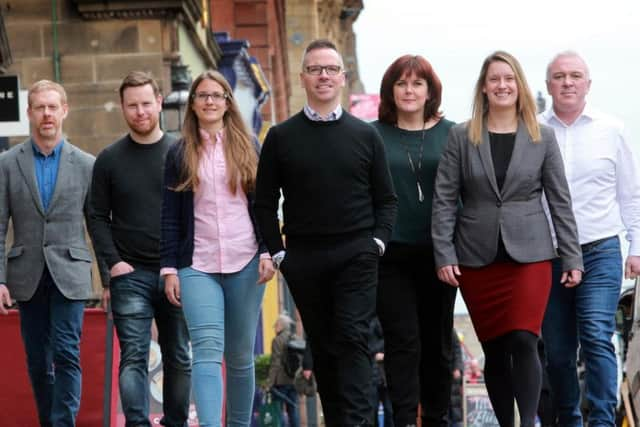Investment '˜a bigger issue than Brexit' for start-up firms


Attracting inward investment is a bigger immediate concern for start-up firms than Brexit or Indyref 2, with 95 per cent needing extra money to move their business forward survey results revealed today show.
The inaugural ‘Scottish Start-up Survey’ – by Informatics Ventures in association with the University of Edinburgh Business School and the Freer Consultancy – points to the unicorn-creating potential of Scotland’s early stage companies in spite of Brexit concerns and funding challenges in 2017, with one respondee referring to Scotland as ‘start-up paradise’.
Advertisement
Hide AdAdvertisement
Hide AdA sample of over 300 companies from ‘Engage Invest Exploit’ (EIE) going back to 2008 and including this year’s cohort of Scottish start-ups pitching at EIE17 this Thursday at the EICC were surveyed and while Brexit and IndyRef2 are viewed as near to medium-term concerns, the more immediate challenges to Scotland’s start-up community are around attracting investment (36 per cent), developing a customer base (29 per cent) and hiring talent (24 per cent).


Funding dominates the findings with 95per cent of the start-ups surveyed requiring further funding over the next twelve months. A total of 61 per cent of start-ups are seeking investment from angels and high net worth private investors this year, 49per cent are on track for Scottish Investment Bank (SIB) funding, 47 per cent are in the market for venture capital funding and 18per cent are considering equity crowdfunding.
The results show 85 per cent of Scottish start-ups are concerned by the political backdrop, with 44 per cent more concerned by Brexit than IndyRef2, 25 per cent of more respondents more concerned by IndyRef2 than Brexit and 17 per cent concerned by Brexit and IndyRef2 in equal measure.
Dr Ben Spigel, chancellor’s fellow and lecturer in entrepreneurship at the University of Edinburgh Business School, said: “It’s no surprise that our entrepreneurs are concerned about the political landscape – there’s a real risk Brexit will make it harder for Scotland’s entrepreneurs to find the best tech and scale-up talent.”
Some 42 per cent of respondents said the ability to attract and retain talent, including non-UK nationals, was their primary concern followed by 15 per cent of respondents who expressed concerns about how Brexit is likely to impact the strength of Scotland’s universities. The strength of Scotland’s universities is seen at the biggest benefit of basing a start-up in Scotland (21 per cent) followed by Government support for start-ups at 18 per cent.


Susanne Mitschke, CEO and co-founder of MindMate, a Glasgow-headquartered start-up who develop apps for Alzheimer’s Disease and Dementia sufferers, says: “With great universities and government support, Scotland is a paradise for starting up. As a founder from Germany, I am personally nervous about Brexit and this is reflected by other entrepreneurs.
“I also see the Scottish funding gap and the gap of tech talent as a concern, also in the light of Brexit. However, I strongly believe that Scotland is well equipped to become one of the world’s most entrepreneurial societies.”
Of the start-ups interviewed, 76 per cent see Ctrip’s acquisition of Skyscanner as a positive development for the Scottish tech ecosystem because it increases international recognition and improves Scotland’s ability to scale its tech companies.
Advertisement
Hide AdAdvertisement
Hide AdSteve Ewing, director of operations at Informatics Ventures, says: “There has been a definite ‘Skyscanner/FanDuel effect’ which has put Scotland further up the world order of tech. The collective hope is that this will help to build even stronger links to the UK and international investor networks that are so important to the future success of the Scottish tech scene.”
Dr Ben Spigel added: “Scotland already has one of the most vibrant and exciting entrepreneurial economies in Europe and the exit of two of its unicorns, Skyscanner and FanDuel, should only help to cement this by creating and inspiring a new generation of expert mentors, founders, advisors and investors.”
Rob Jones, co-founder of FanDuel, said: “With the success on FanDuel, FreeAgent and SkyScanner it’s exciting to see that we can potentially spawn more startups of that ilk that are ambitious and aimed towards large markets like the US. With two ‘unicorns’ who have been there and done it, we really have to capitalise on that success in the next few years to make the most of the funding, the attention and the experience that’s now concentrated here in Scotland. We now have the skills, and more importantly, the mindset from these startups that have understood how to scale up. It’s a really exciting time to be involved in the startup scene here in Scotland.”
Of the start-ups surveyed, 50 of respondents said North America is their most important target market, followed by the rest of Europe (18 per cent), the UK (13 per cent) and Asia (7 per cent).
When it comes to skill sets, developer and engineering talent is most sought after by Scotland’s start-ups for 53 per cent of the sample, with 31 per cent indicating that a chief technology officer (CTO) was their most important hire and, somewhat surprisingly, only 7 per cent saying a chief marketing officer (CMO) was their number one hiring target.
Dr Ben Spigel said: “The findings show just how essential it is for the Scottish Government, the universities and colleges to concentrate on building a skilled and energetic workforce to support the growth of the country’s tech start-ups and scale-ups.”
A total of 75 per cent of those surveyed consider their company to be a “start-up”, while 25 per cent consider themselves to be in the “scale-up” category. Of the sample, 31per cent defined themselves as software as a service (SaaS), 11per cent of the respondents categorised their company as healthtech, 10per cent as biotech, 8 per cent under energy, 8 per cent as digital media, 7 per cent as wearables, 6 per cent as hardware and only 1 per cent as fintech.
Administrate, pureLiFi and snap40 were among the start-ups considered to have the best chance to reach $1 billion or unicorn valuations, while Gareth Williams of Skyscanner, Nigel and Lesley Eccles of FanDuel and Chris van der Kuyl of 4J Studios and Minecraft fame are seen to be Scotland’s most inspirational tech leaders.
Discover more at EIE17 which begins in Edinburgh on Thursday.